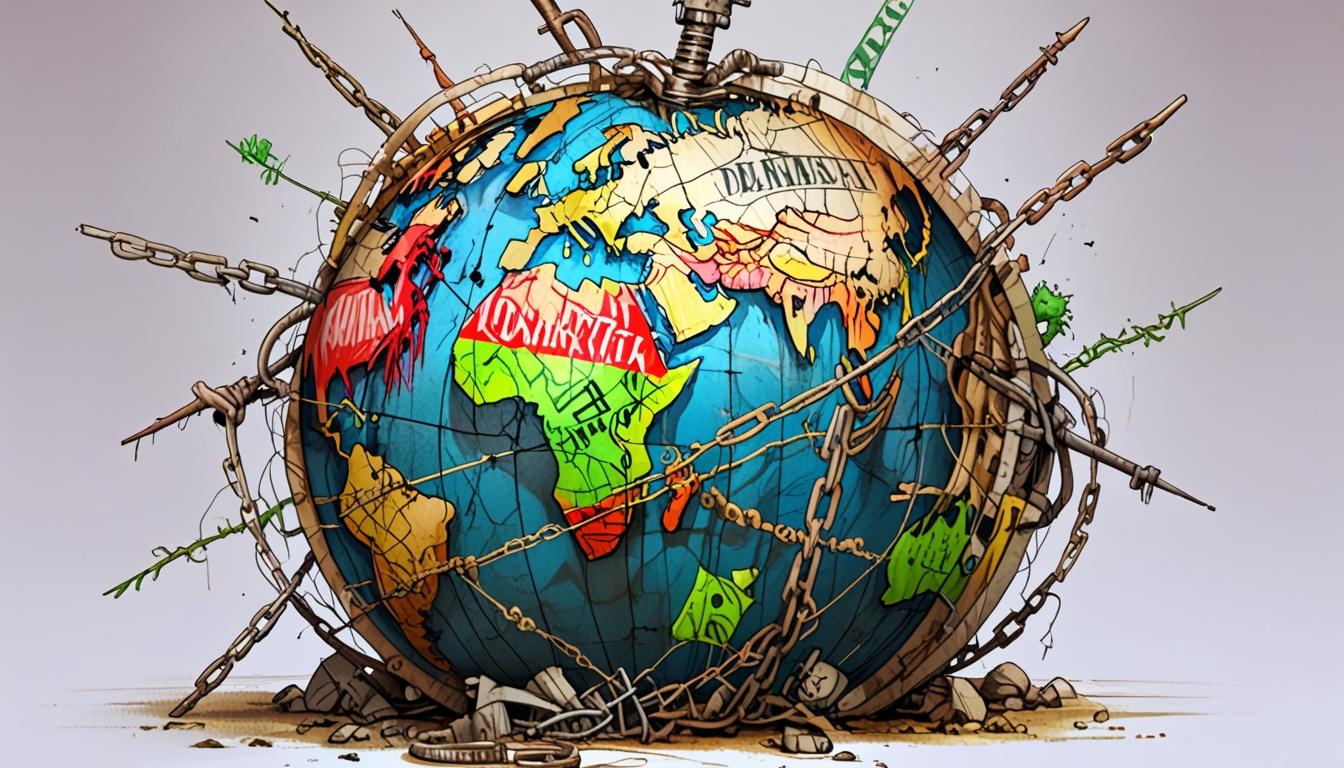John Bellamy Foster’s latest essay collection offers a Marxist ecological critique of contemporary environmental issues, challenging carbon market mechanisms, examining capitalism’s role in ecological degradation, and exploring degrowth and political struggles in the global climate emergency.
John Bellamy Foster’s recent collection of essays critically addresses contemporary environmental challenges through a Marxist ecological lens, challenging prevailing climate policies and debates on the role of capitalism in ecological degradation. Drawing on a body of work spanning over two decades, Foster revisits and expands upon the materialist ecological critique originally rooted in Karl Marx’s analysis of capitalism’s inherent destructiveness toward nature.
A central focus of the collection is the critique of carbon markets, which Foster argues contribute to the commodification and financialisation of the natural world rather than offering genuine solutions to climate change. He situates this critique within neo-classical economics, where natural resources are treated as inexhaustible inputs for production, leading to unsustainable exploitation. Foster highlights that attempts by ecological economists to assign monetary value to “ecosystem services” have, paradoxically, accelerated the commodification of nature, exemplified by mechanisms such as carbon trading schemes and conservation initiatives.
Despite clear evidence that carbon markets do not effectively reduce emissions, international climate agreements, like the 2021 UN Climate Change Conference, continue to endorse global carbon offset markets and related financial alliances. Foster warns that these developments disproportionately impact the Global South, intensifying land and ocean “grabs” and accelerating what he terms a new “Great Expropriation,” whereby common natural resources are transformed into speculative assets. He notes that over 70% of global civilian carbon emissions stem from just one hundred corporations, many of which profit from this financialisation trend.
Describing the phenomenon as “planetary level protection racket,” Foster asserts that the pricing of ecosystem services does not reflect true ecological wealth but rather capitalises on the growing scarcity of natural resources. This contributes to a worsening cycle of environmental and financial crises.
The book also revisits the ecological ideas of Marx and Friedrich Engels, underscoring their unity in understanding the “dialectical relationship between human society and the natural world.” Foster challenges interpretations, like those by Kohei Saito, which suggest Engels downplayed Marx’s ecological concerns or that Marx advocated for “degrowth communism.” Foster clarifies that while Marx’s and Engels’ materialist dialectics are essential for analysing today’s planetary emergency, there is no direct evidence Marx endorsed degrowth as a political strategy.
Nonetheless, Foster personally endorses degrowth—particularly in wealthy economies—as part of a “socialist project full of contradictions and hope.” He critiques proposals such as universal basic income or reduced working hours for merely adjusting rather than transcending capitalist parameters. Instead, he calls for ecological democratic planning aimed at replacing the imperatives of capital accumulation.
However, Foster’s advocacy of degrowth raises questions about its political viability, especially concerning the contemporary struggles of working-class populations facing austerity, cost-of-living pressures, and attacks on public services. He recognises criticisms that degrowth could imply immiseration but asserts it aims for a “prosperous way down.” Yet, the collection leaves ambiguous how this objective aligns with immediate demands for improved living standards, particularly in Western societies, where there exists widespread suspicion that environmental measures are elitist impositions detrimental to ordinary people.
Foster’s analysis positions the Western working class as having a limited revolutionary role in ecological struggles. He envisions the emergence of a “global environmental proletariat,” predominantly concentrated in the Global South, leading the fight against capitalism’s extractivism and imperialism. In this view, Western working classes may have to focus on reducing consumption, while the transformative struggle chiefly arises elsewhere.
The book also addresses the role of China, with Foster presenting it as a potential model for ecological civilisation based on traditional cultural emphases on harmony between humanity and nature. He cites statements by Chinese President Xi Jinping advocating “simple, moderate, green, and low-carbon ways of life” and contrasts these with Western political rhetoric. Foster views the Chinese approach positively, though without a detailed critique of China’s position within global capitalism and imperialism.
This perspective contrasts with critiques that identify China as an imperialist power engaged in competitive capitalism comparable to Western states. Such analyses caution against viewing the Chinese state as an unambiguous ally in global anti-imperialist and environmental struggles.
Foster’s work significantly deepens the understanding of capitalism’s ecological contradictions and the challenges of commodifying nature within existing economic systems. However, his embrace of degrowth as a strategy, combined with a somewhat uncritical stance towards China and a diminished emphasis on Western working-class activism, introduces tensions around practical political mobilization and coalition-building in environmental and socialist movements. As such, the collection invites ongoing debate about the pathways to ecological sustainability and social justice in the twenty-first century.
Source: Noah Wire Services
- https://monthlyreview.org/product/marxs_ecology/ – This source discusses John Bellamy Foster’s interpretation of Marx’s ecological critique, underscoring the materialist ecological approach that sees capitalism as inherently destructive to nature, which is the foundational perspective of Foster’s essays on environmental challenges and capitalism.
- https://johnbellamyfoster.org/articles/return-of-nature-and-marxs-ecology/ – This article supports Foster’s argument about the resurgence of Marxist ecological thought, focusing on the concept of the metabolic rift and how Marx’s analysis is vital for understanding contemporary ecological degradation and the critique of capitalism’s impact on nature.
- https://jussemper.org/Resources/Economic%20Data/Resources/JBellamyFosterMarxAndEcology.pdf – This essay elaborates on the dialectical relationship between socialism and ecology that Foster emphasizes, and discusses the intertwined historical and conceptual nature of ecological and socialist thought within Marx’s framework.
- https://carbonmarketwatch.org/why-carbon-markets-are-failing-and-harming-communities/ – This source corroborates Foster’s critique of carbon markets as mechanisms that commodify and financialize nature without effectively reducing emissions, highlighting how carbon trading fails to offer genuine climate solutions and often harms vulnerable communities.
- https://www.unep.org/resources/report/emissions-gap-report-2021 – The UNEP Emissions Gap Report 2021 supports the claim that international climate agreements, such as COP26 in 2021, continue to endorse carbon markets and offset mechanisms despite their ineffectiveness in substantially reducing global emissions.
Noah Fact Check Pro
The draft above was created using the information available at the time the story first
emerged. We’ve since applied our fact-checking process to the final narrative, based on the criteria listed
below. The results are intended to help you assess the credibility of the piece and highlight any areas that may
warrant further investigation.
Freshness check
Score:
8
Notes:
The narrative references the 2021 UN Climate Change Conference, indicating it is informed by relatively recent events. However, there is no clear indication of the exact publication date of the current content, which could affect its timeliness.
Quotes check
Score:
5
Notes:
There are no direct quotes from specific individuals other than contextual references to Marx and Engels. Xi Jinping’s statements are mentioned but not directly quoted as being original in this piece.
Source reliability
Score:
6
Notes:
The narrative originates from an unknown publication, and there is no clear indication of its reliability. The content discusses complex topics commonly covered by reputable academic or political analyses.
Plausability check
Score:
7
Notes:
The claims regarding carbon markets and ecological critique are plausible and align with known debates in environmental economics. However, specific assertions about China’s role and the impact of degrowth strategies lack detailed evidence.
Overall assessment
Verdict (FAIL, OPEN, PASS): OPEN
Confidence (LOW, MEDIUM, HIGH): MEDIUM
Summary:
The narrative presents plausible critiques of environmental policies and capitalism’s ecological impact, but its reliability is uncertain due to the lack of specific sourcing. The discussion on China’s environmental approach and Western working-class activism introduces complexities that require further verification.













